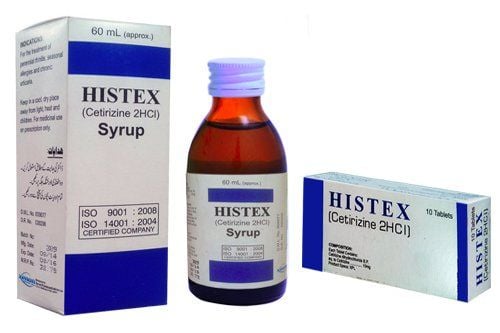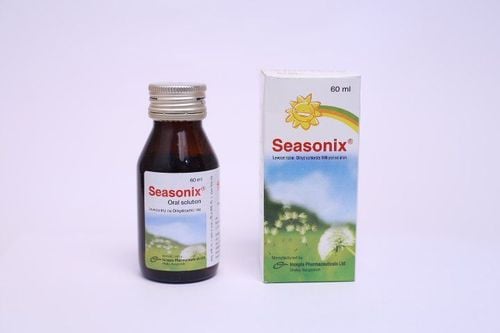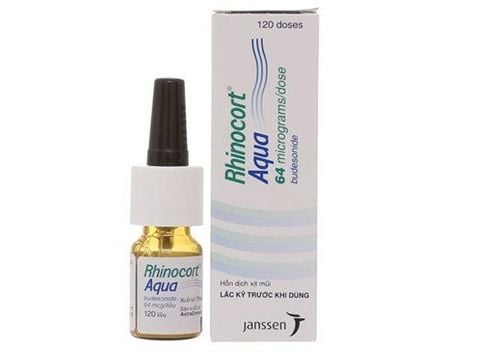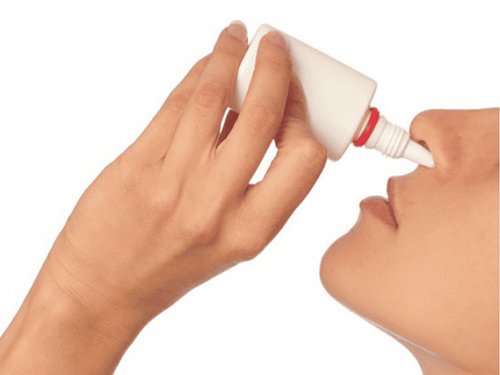This is an automatically translated article.
The article was professionally consulted with Doctor Phan Dinh Thuy Tien - General Internal Medicine - Department of Medical Examination & Internal Medicine - Vinmec Nha Trang International General Hospital.Nasal vasoconstrictors are nasal drops or sprays, commonly used to relieve nasal congestion. However, it is necessary to avoid overuse of vasoconstrictor nasal drops to treat nasal congestion because it can cause serious consequences.
1. What is a vasoconstrictor?
Vasoconstrictor drugs, also known as anti-congestive drugs, with the main ingredients are Pseudoephedrine (Sudafed), Oxymetazoline (Afrin), Phenylephrine (Sudafed PE), Naphazoline, ... The drug has two forms, small and spray, with the main effect: constricts blood vessels in the nose to reduce runny nose, stuffy nose.MORE: How to get rid of stuffy nose without depending on vasoconstrictors?

Thuốc co mạch có tác dụng điều trị sổ mũi
2. In what cases is vasoconstrictor used?
When having a stuffy nose, patients often don't go to the doctor but buy medicine on their own because they think that stuffy nose is a condition in which the circulation in the nasal mucosa is blocked. However, the main cause of nasal congestion is an over-expansion of the blood vessels in the nose.Vasoconstrictors are used in cases of allergic rhinitis, sinusitis, colds, flu, seasonal allergies to dilate blood vessels in the nose. Then, using a nasal spray or drop will cause the blood vessels to constrict, thereby helping to relieve congestion because the airways in the nose have more space.
MORE: Application of vasopressors in treatment
3. Be wary of using vasoconstrictor drugs that cause rhinitis and nasal congestion
Abuse of nasal vasoconstrictors such as overdosing and long-term use can cause rhinitis and nasal congestion. Up to now, the cause of nasal congestion, drug-induced rhinitis has not been clearly determined, however, there are a number of theories put forward as follows:Vasoconstrictors cause edema of the nasal mucosa due to continuous vasoconstriction Blood in the nose, not enough blood supply to nourish the nasal mucosa. Drug resistance is caused by a reduced number of drug-responsive receptors and leads to nasal congestion. After the vasoconstrictor has worn off, compensatory vasodilation occurs. Vasoconstriction may be lost and vasodilation may occur with continuous long-term use of the drug. Rhinitis, nasal congestion caused by vasoconstrictor drugs, if not treated, can lead to hypertrophy of the nasal conjunctiva, atrophic rhinitis, chronic sinusitis, sleep apnea, ... dangerous to health.

Lạm dụng thuốc co mạch nhỏ mũi có thể gây viêm mũi, nghẹt mũi
4. How does vasoconstrictor cause rhinitis and nasal congestion?
First, when the patient feels rhinitis, stuffy nose after a period of using vasoconstrictor nasal drops without symptom relief, visit the doctor, the doctor will ask for information about the drugs used. When examining the nose, the doctor will look for signs to check for nasal congestion, rhinitis caused by medication.Symptoms of rhinitis, nasal congestion due to vasoconstrictor drugs are commonly known as:
The nasal mucosa is red and thicker than usual. Nasal congestion but no sneezing or runny nose or sneezing. Snoring a lot while sleeping, the most dangerous thing is that it can cause sleep apnea if you have rhinitis caused by medication. Other symptoms such as headache, restlessness, anxiety, ... Unlike nasal congestion, rhinitis caused by weather, the use of vasoconstrictor drugs that cause these two symptoms usually does not change with time or duration. weather, lateral environment.
5. Treatment of vasoconstrictor nasal drops that cause rhinitis, nasal congestion
Abuse of vasoconstrictor nasal drops not only causes rhinitis, nasal congestion but also can cause addiction. At that time, the patient should visit the doctor for instructions to reduce the dose until the drug can be stopped completely. Stopping the medication immediately can make your stuffy nose worse.Besides, the doctor will also prescribe the alternative use of some other drugs that cause nasal congestion and rhinitis to treat the main cause of this condition. Corticosteroid nasal sprays with short-term tapering doses (with or without systemic oral medications) may be indicated. However, the drug can cause side effects such as headache, nasal congestion during the first week of use.
In addition, the doctor can also prescribe an oral vasoconstrictor instead, but it should be noted that the drug can cause an increase in blood pressure.
Using vasoconstrictor nasal drops should be wary of the drug can cause rhinitis, nasal congestion if abused. At that time, the symptoms not only do not improve, but they can also worsen and progress to chronic or dangerous complications. Therefore, to ensure health, patients should go to medical centers for examination and prescription drugs with appropriate dosage.
Vinmec International General Hospital is a general hospital that has the function of examining and treating ENT diseases such as sinusitis, rhinitis, allergic rhinitis, chronic rhinitis, tonsillitis, and pain. throat, tinnitus and many other diseases. At Vinmec, we have also performed endoscopic diagnosis and treatment with modern medical methods for ear, nose and throat diseases, which not only brings high efficiency but also minimizes complications of recurrent disease. The great success is because Vinmec is always fully equipped with modern facilities, examination and treatment procedures are carried out by a team of experienced and qualified doctors that will bring about treatment results. optimal for customers.
To register for examination and treatment of ENT diseases at Vinmec International General Hospital, you can come directly or contact the call center for service.
Please dial HOTLINE for more information or register for an appointment HERE. Download MyVinmec app to make appointments faster and to manage your bookings easily.













